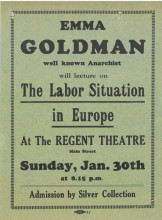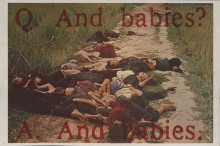Nora Dolliver
Library Blogs
Showing 1 - 10 of 18 items
Results
for Date: March 2018

We are very excited to announce that the Labadie Collection has acquired a new Emma Goldman archive. This is an important collection that had until recently been in private hands.

In this fourth entry in Donna Leon's mystery series set in Venice, Commissario Guido Brunetti investigates the deaths of three prominent Venetian businessmen, as well as their connection to eight young women who died when a truck crashed in the mountains of northern Italy. Meanwhile, his teenage daughter Chiara shows signs of following in her father's footsteps, as she becomes involved in the case.

As the fashionable elite came to eat dinner later and later in the day, supper became almost obsolete. As Maria Rundell notes in the 1813 edition of A New System of Domestic Cookery, “hot suppers are not much in use where people dine very late.” One exception to this rule was a ball, when late hours and active exercise called for substantial evening fare. In Emma, several of the main characters visit a local inn to assess its ability to host a ball, and much is made of the question of where to serve the supper. In the absence of a suitable room, Mrs. Weston proposes simply having sandwiches, but is adamantly shot down. In the words of the narrator, “A private dance, without sitting down to supper, was pronounced an infamous fraud upon the rights of men and women.”

Have you ever wondered what the Bennet sisters' adventures in Jane Austen's Pride and Prejudice might look like in the 21st century? On Wednesday, March 28th from 6:00-7:30pm, join Anne Charlotte Mecklenburg, PhD student in the University of Michigan's English Department, for a screening of selected mini-episodes from the web series The Lizzie Bennet Diaries, followed by discussion. This event will take place in the Shapiro Undergraduate Library, Screening Room 2160.

Han’s book provides insight into current events—Facebook, Cambridge Analytica, Russian propaganda, etc.—Big Data is the new Big Brother and it is Big Business. All of our sharing, all of our liking, all of the tracking of our every digitally connected movement (both voluntary and involuntary) has created the digital panopticon. We are transparent, we are quantified, we are stored and retrieved, we are added and reduced. We are packages of data to be bought and sold. But, Big Data is a Smart Power. It is friendly and it is Likeable. The power of Big Data is that it knows us and increasingly it can shape and predict our behavior.

As noted in Dining with Jane Austen II: No Such Thing as Lunch?, dinner shifted from noon-time to evening over the course of the 18th century, but this change occurred slowly and unevenly, with the result that certain households - especially those with claims to urbanity and fashion - might eat their main meal of the day much later than others. In Sense and Sensibility, The Dashwoods dine at 4pm at home in Barton Cottage, but in London, Mrs. Jenning’s begins dinner at 5 o’clock. In Pride and Prejudice, dinner is served at Longbourne at 4:30, but the fashionable Bingleys bring their London hours to Netherfield and dine at 6:30pm.

Update on work done by the Digital Preservation Unit including efforts on the Digital Preservation Lab, digital file formats, and community outreach.

In the second of two posts, Informationists from the Taubman Health Sciences Library share their research project to improve library integration within the U-M School of Nursing curriculum. Using a mixed methods approach, they are investigating undergraduate student information seeking needs and behaviors.
•
In just a couple of short weeks, the CVGA will be involved in an Art & Gaming Symposium, which will bring together academics, game makers, and game players to discuss the role of art in gaming. How is art reflected in games? How does one create art through games? How do we view games as art? These questions will be explored through speakers, panels and discussion in a one-day symposium on Saturday, April 7, 2018, on the campus of the University of Michigan & the Ann Arbor District Library.

Fifty years ago, on March 16, 1968, in the Vietnamese village of My Lai in Quảng Ngãi Province, American soldiers, led by Lt. William Calley, summarily executed over 500 men, women, children, and babies at point blank range.